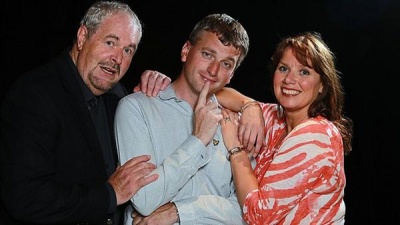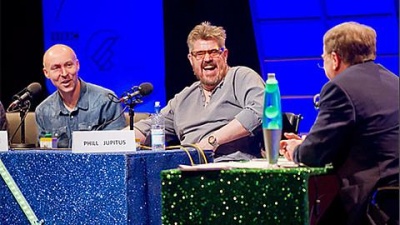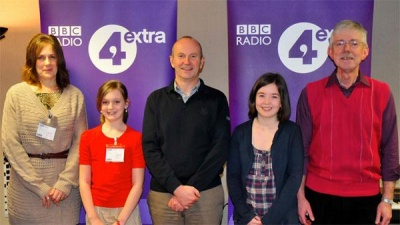Weaver's Week 2012-07-08
Last week | Weaver's Week Index | Next week
To the outer reaches of the BBC's empire, for three programmes going out on the steam wireless. Though, for our purposes, it's the digital steam wireless. How do we know it's digital steam? It comes out in little bits.
Contents |
IQ/NI
BBC Radio Ulster, from 9 June
Joel Taggart hosts the programme, with resident team captains Gerry Kelly and Nuala McKeever. Who are these people, asks a UK-wide audience. The Northern Ireland audience knows them already; if the media scene in the province is impenetrable to outsiders, it's almost incestuous in the way everyone appears on everyone else's shows. No wonder Eamonn Holmes left.
Each of the captains leads a team of three players, and they're introduced with just enough to identify themselves. Almost straight away, we're into round one. What are these people blithering on about? We're played brief clips of Ulster people talking, and the objective is to work out what they are all describing. It could be a person, an event, a natural phenomenon. Five points if someone can work out the subject of the blitheration after the first clip, a point off for each additional clue required.
Getting the right answer doesn't just qualify the team for the points, but they get first crack at the subsidiary questions. These five posers are related to each other in the traditional The Krypton Factor style: the answer will be found somewhere in the next question. IQ/NI clearly subscribes to the Six Degrees of Six Counties theory: everyone from the area can be related to everyone else via a chain of no more than six links.
After this series of questions, there's a slightly longer chat with one of the guests. Yes, rather than take forever to get the show rolling, they're going to intersperse the conversations throughout the programme. We approve of this sort of thing, it means we're never too far from an interesting round. Though we might reconsider for the second round, True or False. Here, the members of team A tell a story about things found in Northern Ireland, and team B must work out whether it's a fact or a tissue of lies. The round falls between two stools: the stories are long enough to try our patience, but too short for us to relax into them and enjoy the panel's story-telling abilities.
It's the music clip next: a brief snatch of Irish-sounding music, the sort they'd put behind shots from low-flying helicopters showing the rolling hills of Ireland. This leads into another Six Degrees round, during which we are (in effect) asked to remember Neil Hannon's specialist subject when he won Celebrity Mastermind. This blog probably saw the programme, but even we couldn't tell you what the specialist subject was. We'd have difficulty remembering that he won the show. Most of the questions are a good deal easier than this.
"Order, order" is the name of round four, and the teams are going to be asked to put some things in order. This is somewhat easier than the equivalent round on Accumulate!, as there are only three things to put in order, and there's no red herring. This is a radio programme, and it's not easy for the listener to remember six things without a visual clue.
"Where in the World" provides another opportunity to use the more clues for fewer points motif, this time the members of the Great Nornirish Public are describing something in the six counties. Again, this leads into a group of linked questions.
The scores are given, ahead of the final round. The quick-fire round is played by one of the guests from each team. It comprises 60 seconds of questions for each player, some of the questions are personalised to the team and the player – in the sample episode we heard, Wendy Austin was asked about her old school, and a football player about a club he once managed.
And there ends the quiz. All of the questions have some link to Northern Ireland, and part of the aim of the game is to explore the diaspora, what people from the six counties have done after moving away. There's banter and chatter with the guests, and the audience is able to join in with the panellists, cheering to say that they listen to Liveline. Even the buzzers crackle with interest, a very modernist fizzing noise before a voice shouts out the player's name. A jolly programme, it moves along at a fair clip, never dwelling long enough for us to consider re-tuning. The result is of little consequence: this is far more of an entertainment than it is a serious quiz.
The Guessing Game
BBC Radio Scotland, April – May
Clive Anderson is the host here, and he tells us this programme has been described as "well within budget" by the BBC Accounts Department. It was introduced by Gus And Fin Plus One, two men and a ukulele singing a once-popular song, and Clive begins by inviting us to guess who the guests are, and then chattering with them. Oh, do get on with it.
It's nigh-on four minutes before we're into round one, where Clive invites his panel to take a guess at some deep philosophical questions. "What's the difference between the shape of the Earth and Ann Widdecombe?" Only one of them hosted a rubbish programme on a spectacularly obscure satellite channel, obviously. The rest of us can see the Earth by going to a window and looking out.
The Guessing Game is built on difficult knowledge, and insists on giving the correct answers where one is known. Sometimes, this flows naturally from the conversation. Other times, Clive has to drag it out of the panellists – it took almost a minute and a dozen guesses for them to work out that a man's beard grows when he thinks about sex. It's enough to suck the fun out of the programme: please, don't interrupt the comedy with dull accuracy. Interrupt it with fun accuracy.
Eventually, round two is upon us. Guess who said that, with David Kane using his broad Glaswegian drawl to voice quotes from people like Paris Hilton. We really are dredging up some rubbish video tapes here. Round three follows, it's the audio round. Guess the lyric invites the panellists to complete the words of a song in a witty, amusing, apt, and apposite manner. For instance, "That's neat that's neat that's neat that's neat I really love" is always going to be finished by Phill Jupitus chiming in with the word, "Neatness".
There's an even better radio round next, in which the competitors write down their answers. It's a group of themed questions, and these questions will be discussed by the panel. And they will be discussed, and discussed, and discussed. Some of the answers might be funny, but they're more than eclipsed by the increasingly tedious witteration.
Points have been handed out via some sort of logic that might make sense at the time, and a winner is declared. "An inauspicious start, it went downhill, and ended badly" says Clive Anderson. He's trying to be self-deprecating, but only provided the accurate summary of the show. We're not going to get that 27 minutes back, are we?
Keep It In The Family
Part of The 4 O'Clock Show, Radio 4 Extra, February – March
Fred MacAulay is on hosting duties for this little contest. It's played between two pairs of players, one a child of about 10, the other a parent or older relative. Why this arrangement? The 4 O'Clock Show is BBC Radio's one remaining programme specifically for children, and the listeners are to hear people just like themselves.
After a long chat with the contenders – almost four minutes in the sample episode we heard – round one is a choice from five pre-determined subjects. Initial possession is determined by a number question, but it's the opposition who pick the subject. Should the team answering questions get them right, they keep the topic in the family. See what they did there? If both players are stumped, the subject goes across to the other side. Ten questions in the round.
Round two is round one in reverse: the team that won the toss-up question chooses a subject for their opponents, hoping to take it themselves. Round three is some maths and English questions, a minute of them for each team. Fred advises that we might need a pencil and paper for this round, it helps when spelling "approximate", and it might help when filling in some long expanses of dead air.
The final round is two minutes of quick-fire buzzer questions, two points for a correct answer: one off and the possibility of a bonus if wrong. But there's a twist: in the first minute, only the children can answer the questions. With the additional points, the game isn't over until it ends. Prizes? They've got prizes appropriate to the show's budget: certificates for all players, BBC Radio 4 Extra mugs for the winners.
The questions are about right for the audience: the sort of thing the reasonably-educated child would expect to learn in the upper reaches of primary school, and know fully by secondary. There are electronic noises, buzzes and beeps throughout the broadcast, they'd probably sound a heck of a lot better if 4xtra didn't broadcast in sparkling mono sound to most listeners.
Overall, we found the programme to be an entertaining little diversion, though we found it dragged in places and we didn't have a tremendous desire to listen to more than the one episode. The best thing we can say is that it wasn't prolonged for no good reason, being completed in 18 minutes.
This Week And Next
Andrew Lloyd Webber gave an interview to the Rusty Old Radio Times. "I don't think there was a single black face at this year's Eurovision Song Contest," he said. This is hogwash: at least one of Italy's backing singers fits that category. So does one of the Norwegian backing dancers. So does the Ukrainian lead singer.
Lord Lloyd-Webber was attempting to justify his remarkable claim that Europe is full of racists, and that's why the UK hasn't won Eurovision in forever. The fact that eight out of ten BBC entries are utter rubbish clearly has nothing to do with it. And, in fairness, Lord Hyphen's song was one of the better ones. The interview was intended to promote his new talent search programme, Superstar, featuring someone to play the role of Jesus H Christ. What was wrong with Todd Carty?
The week to 24 June was meant to be The Chase's big one. 20.35m people will see England and Italy fail to score any soccerpoints, and BBC1 failed to show any shows we call game. Well, apart from billing The Best of Tonight's The Night; this festival of closing credits was cancelled and replaced by Some Stuff From Tonight's The Night.
All of these shenanigans left ITV's teatime smash in pole position, and 2.5m viewers on Thursday was its best. And it would have been the week's biggest game show, if it wasn't for that pesky David Cameron. His personal criticism made Jimmy Carr a legitimate target for japery on his own show, and 8 Out of 10 Cats would prove to be much more popular than usual. 2.65m tuned in, roughly double the usual audience, and the top spot was claimed. Mock the Week finished third, with 2.3m; Big Brother's best was 1.8m on Thursday. Elsewhere, A League of Their Own had 660,000 viewers on Friday, Come Dine with Me took 345,000 on Sunday, and Bit on the Side 220,000 when it moved to 5* on Saturday.
Superstar continues (ITV, 8pm Sunday and Saturday), there's Millionaire (ITV, 9pm Mon – Wed), Secret Dealers (ITV, 3pm) and All New Blockbusters (Challenge, 8pm), which begins with a Konnie Huq special. And can anyone possibly beat The Cube (ITV, 7pm Saturday)? If anyone can, we reckon C4's Twiglet can.
To have Weaver's Week emailed to you on publication day, receive our exclusive TV roundup of the game shows in the week ahead, and chat to other ukgameshows.com readers, sign up to our Yahoo! Group.




